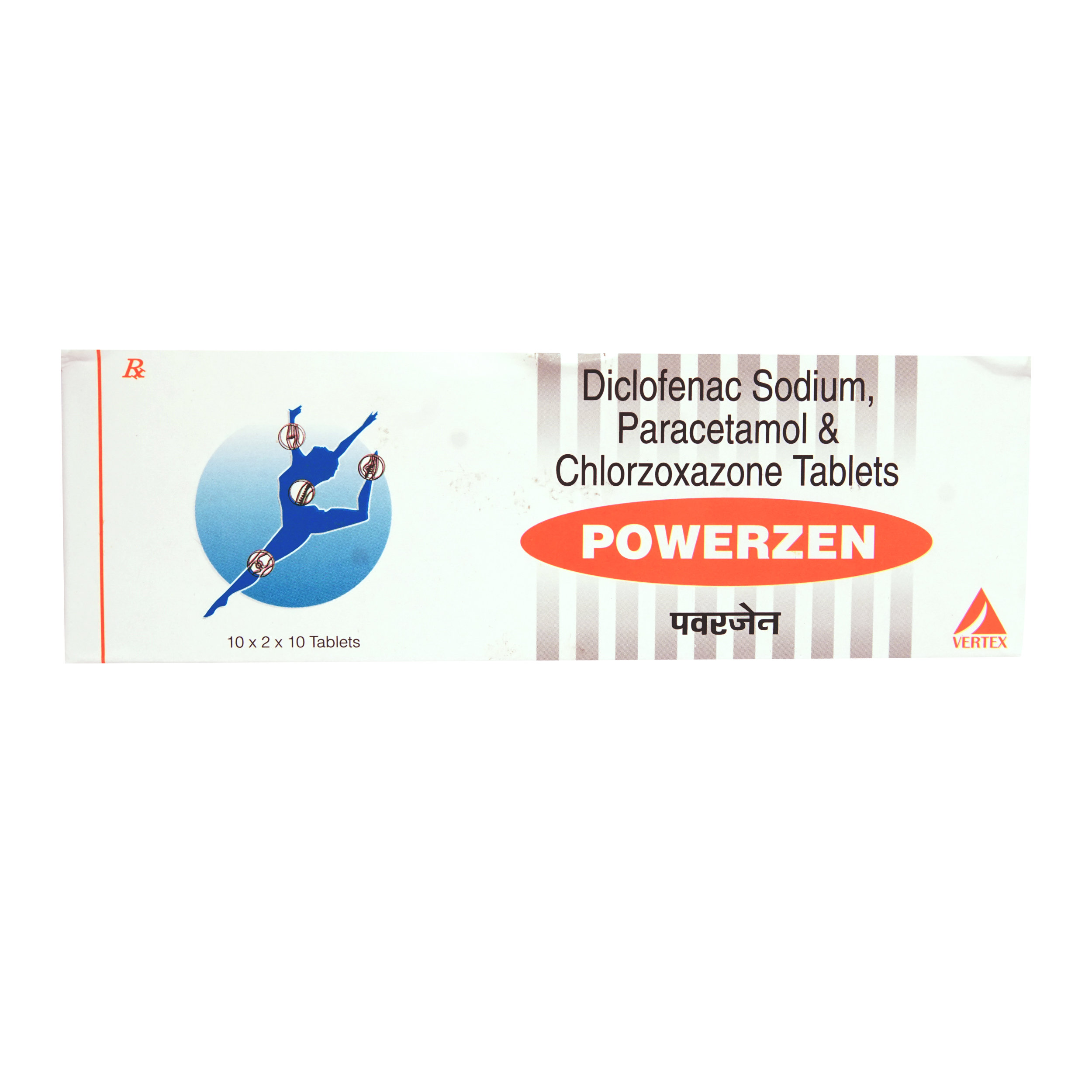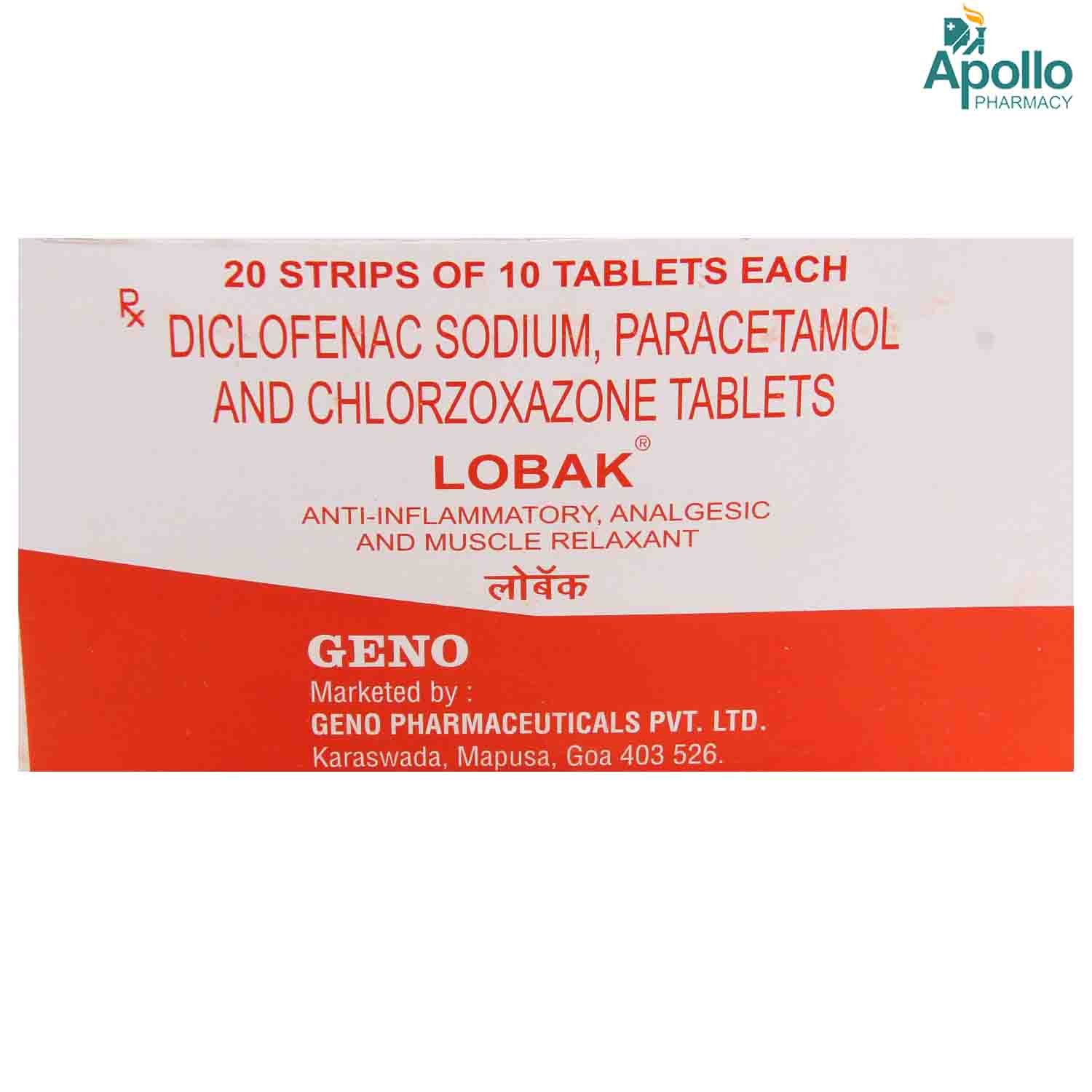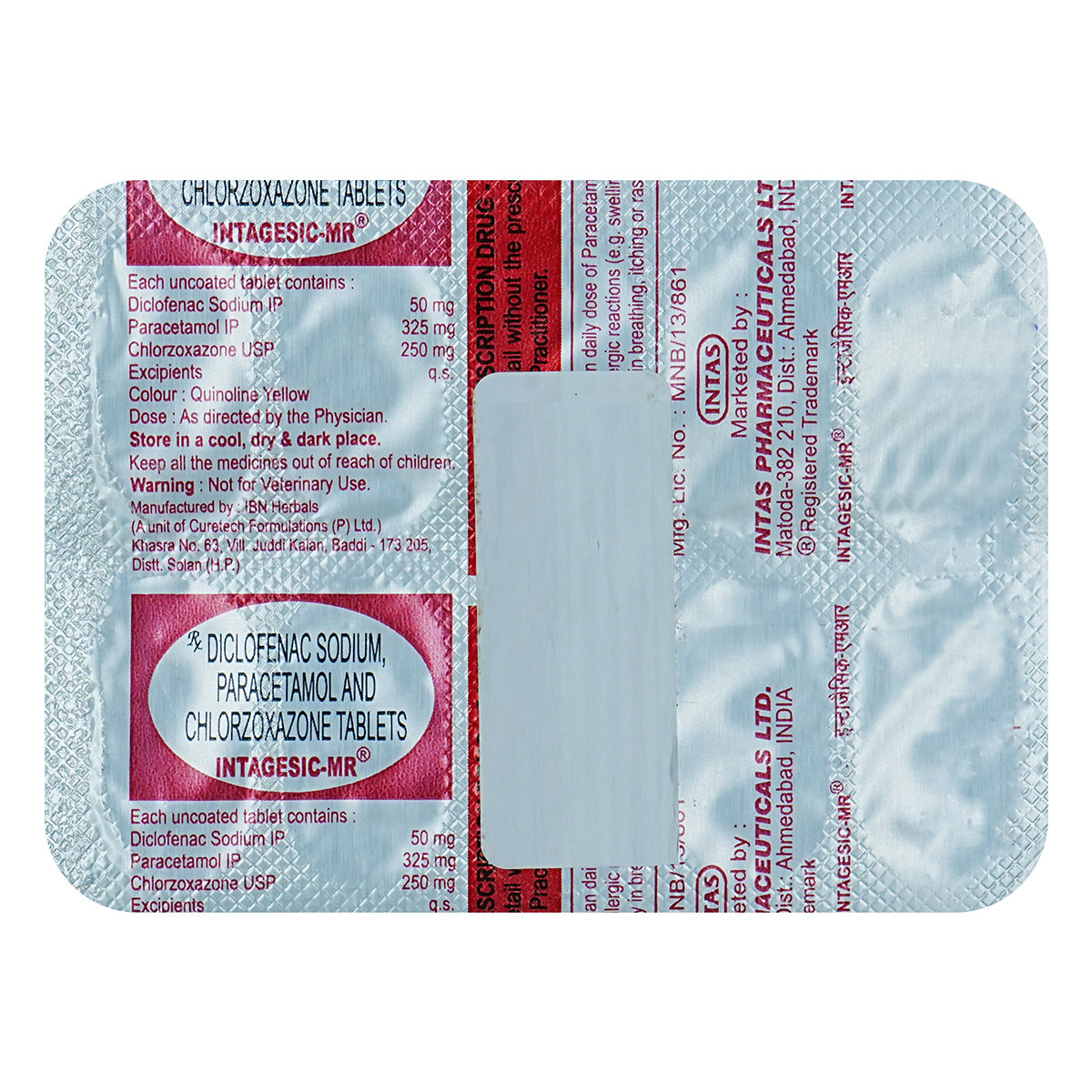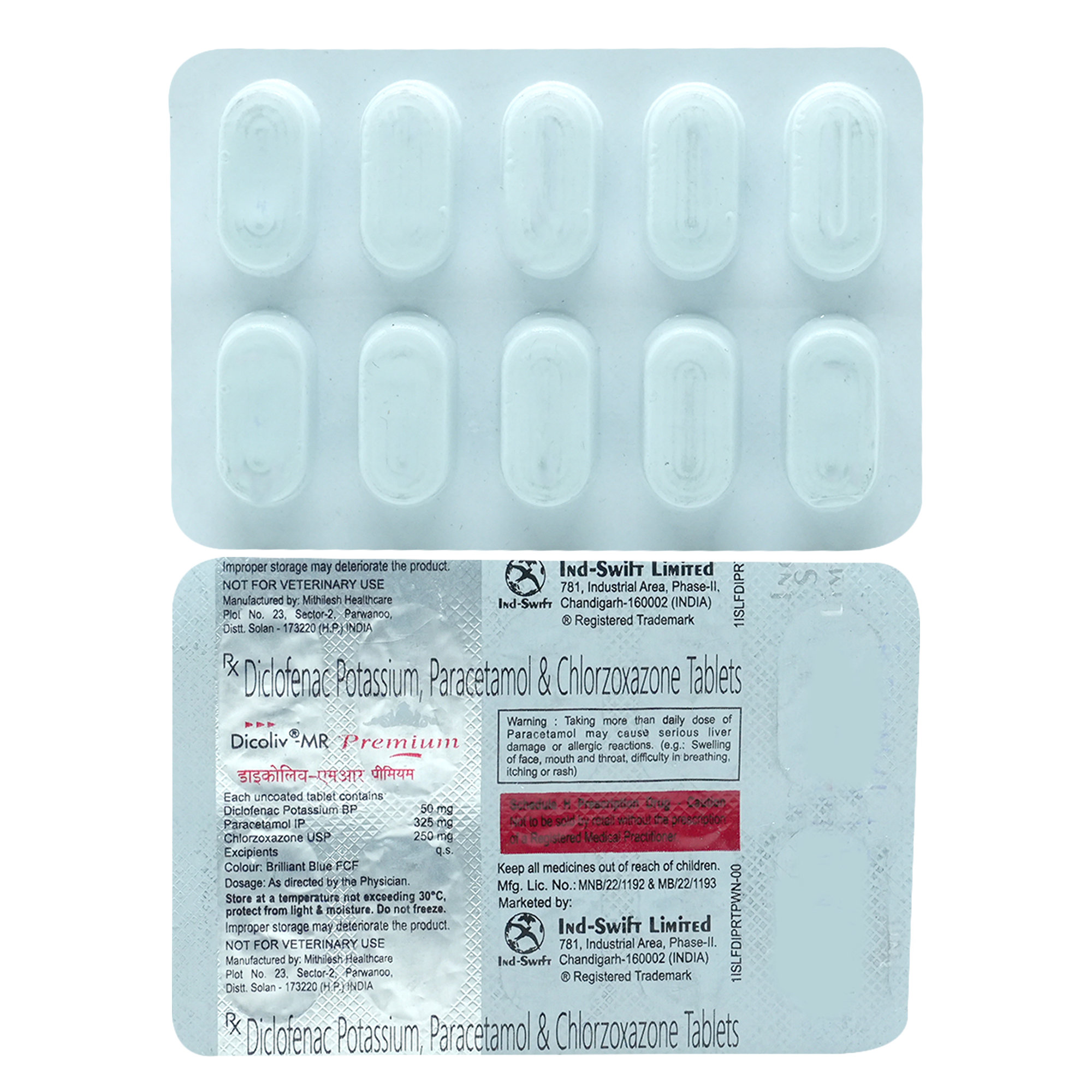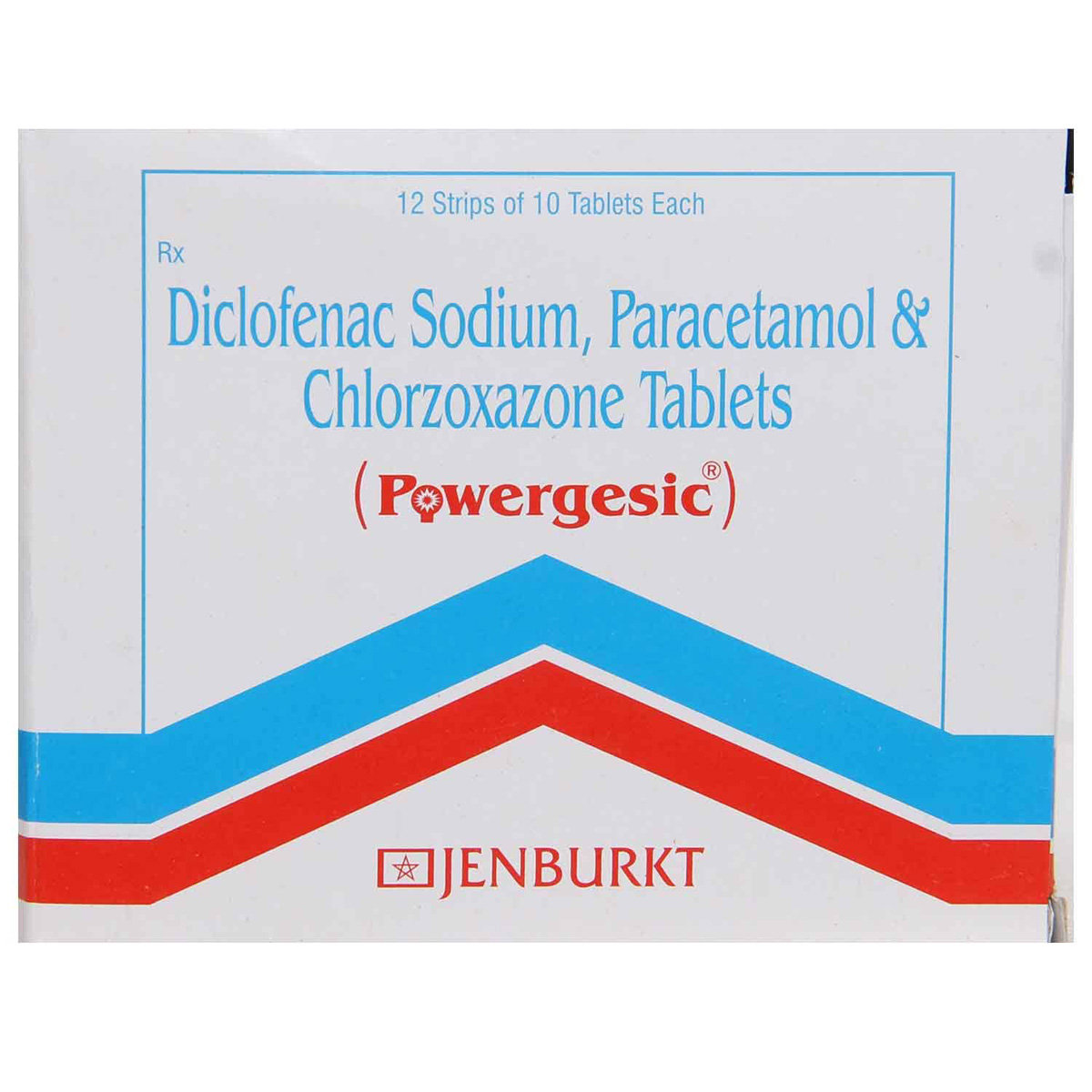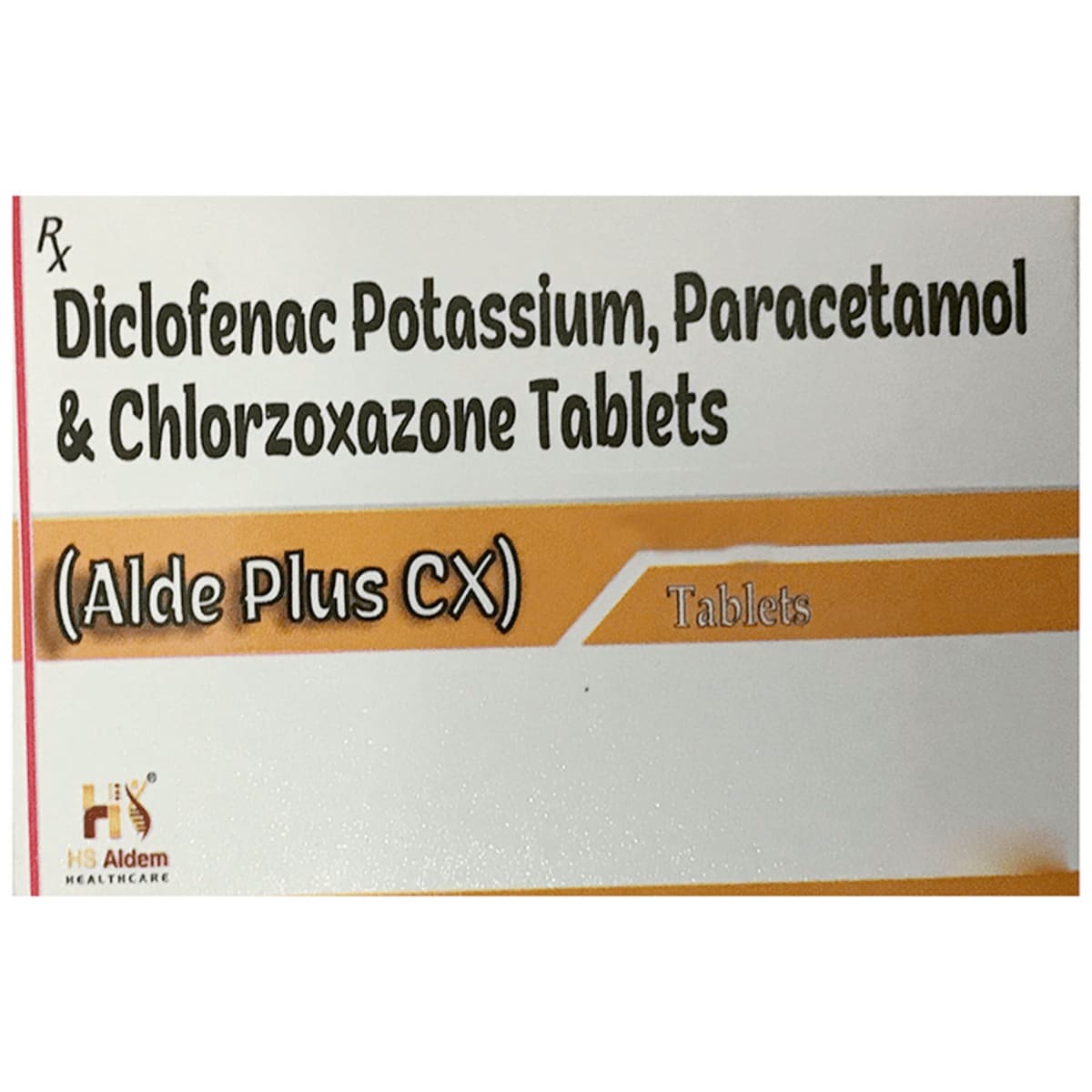Dicloam-MR Tablet 10's
MRP ₹60
(Inclusive of all Taxes)
₹9.0 Cashback (15%)
Provide Delivery Location
Online payment accepted
 Prescription drug
Prescription drugWhats That
Manufacturer/Marketer :
Consume Type :
Expires on or after :
Return Policy :
About Dicloam-MR Tablet
Dicloam-MR Tablet belongs to the class of drugs known as 'non-steroidal anti-inflammatory drug' (NSAID). Dicloam-MR Tablet is used in the reduction of musculoskeletal pain due to tissue injury, resolution of post surgery inflammation and oedema (swollen tissue with fluid). Pain can be temporary (acute) or long term(chronic) in nature. Musculoskeletal pain can be caused due to soft tissues (muscle, tendon, and ligaments) injury. Extreme tissue pain and inflammation caused due to sprains, strains or trauma or post-surgery may require a prolonged amount of time to heal.
Dicloam-MR Tablet is a fixed-dose combination composed of three medicines namely: Diclofenac, Paracetamol and Chlorzoxazone. Diclofenac works by blocking the action of a chemical messenger known as cyclo-oxygenase (COX) which causes pain and swelling at the injured or damaged tissue site. Paracetamol acts as a mild analgesic (mild pain reducer) and antipyretic (fever reducer) which enhances the pain relief action of Diclofenac. Third medicine i.e. Chlorzoxazone is a muscle relaxant, helps by blocking nerve impulses or pain sensations sent by the brain and causes relaxation of muscles.
Dicloam-MR Tablet can be taken with or after the meal. To avoid stomach upset Dicloam-MR Tablet can be taken with food or milk. It should be swallowed whole with a glass of water. Do not take Dicloam-MR Tablet if your pain lasts for more than ten days or fever lasting for more than three days. Do not take a double dose if you missed one dose. Like all medicines, Dicloam-MR Tablet may cause side effects, although not everybody gets them. Most of the side effects of Dicloam-MR Tablet are drowsiness, constipation, diarrhoea, stomach upset, slight discolouration of urine, and ringing or buzzing sounds in the ears. In case of any discomfort, speak with your doctor.
Do not take Dicloam-MR Tablet if you are allergic to painkillers like aspirin, paracetamol, naproxen or diclofenac. It is not recommended for use in children, people with liver disease, heart disease or gastric ulcers/bleeding problems. Dicloam-MR Tablet may be associated with a small increase in the risk of heart attack (myocardial infarction). Avoid consumption of alcohol as it may damage your liver and cause even more side effects on taking this drug. Consult your doctor if your symptoms of pain, inflammation and fever do not disappear even after ten days.
Uses of Dicloam-MR Tablet
Directions for Use
Key Benefits
Dicloam-MR Tablet is composed of three medicines namely: Diclofenac, Paracetamol and Chlorzoxazone. Diclofenac works by blocking the action of a chemical messenger known as cyclo-oxygenase (COX) which causes pain and swelling at the injured or damaged tissue site. Paracetamol acts as a mild analgesic (mild pain reducer) and antipyretic (fever reducer) which enhances the pain relief action of Diclofenac. Third medicine i.e. Chlorzoxazone is a muscle relaxant, helps by blocking nerve impulses or pain sensations sent by the brain and causes relaxation of muscles.
Storage
- Drink water or other clear fluids.
- To prevent worsening of pain, limit intake of tea, coffee, or alcohol.
- Include bland foods like rice, toast, crackers, and rice in your diet.
- Avoid lying down immediately after eating as it may cause indigestion or heartburn.
- Avoid acidic and spicy food as it may cause indigestion.
- Inform Your Doctor: Notify your doctor immediately about your diarrhoea symptoms. This allows them to adjust your medication or provide guidance on managing side effects.
- Stay Hydrated: Drink plenty of fluids to replace lost water and electrolytes. Choose water, clear broth, and electrolyte-rich drinks. Avoid carbonated or caffeinated beverages to effectively rehydrate your body.
- Follow a Bland Diet: Eat easy-to-digest foods to help firm up your stool and settle your stomach. Try incorporating bananas, rice, applesauce, toast, plain crackers, and boiled vegetables into your diet.
- Avoid Trigger Foods: Steer clear of foods that can worsen diarrhoea, such as spicy, fatty, or greasy foods, high-fibre foods, and dairy products (especially if you're lactose intolerant).
- Practice Good Hygiene: Maintain good hygiene to prevent the spread of infection. To stay healthy, wash your hands frequently, clean and disinfect surfaces regularly, and avoid exchanging personal belongings with others.
- Take Anti-Diarrheal Medications: If your doctor advises, anti-diarrheal medications such as loperamide might help manage diarrhoea symptoms. Always follow your doctor's directions.
- Keep track of your diarrhoea symptoms. If they don't get better or worse or are accompanied by severe stomach pain, blood, or dehydration signs (like extreme thirst or dark urine), seek medical help.
- Take medications with food (if recommended): It can help prevent stomach distress and indigestion.
- Eat smaller, more frequent meals: Divide daily food intake into smaller, more frequent meals to ease digestion.
- Avoid trigger foods: Identify and avoid foods that trigger indigestion, such as spicy, fatty, or acidic foods.
- Stay upright after eating: Sit or stand upright for at least 1-2 hours after eating to prevent stomach acid from flowing into the oesophagus.
- Avoid carbonated drinks: Avoid drinking carbonated beverages, such as soda or beer, which can worsen indigestion.
- Manage stress: To alleviate indigestion, engage in stress-reducing activities like deep breathing exercises or meditation.
- Consult a doctor if needed: If indigestion worsens or persists, consult a healthcare professional to adjust the medication regimen or explore alternative treatments.
- Tell your doctor about your GAS symptoms. They may change your medication regimen or prescribe additional drugs to help you manage them.
- To manage GAS symptoms, eat a balanced diet of fibre, vegetables, and fruits.
- Drink enough water throughout the day to avoid constipation and treat GAS symptoms.
- Regular exercise like yoga and walking may help stimulate digestion and alleviate GAS symptoms.
- Take probiotics only if your doctor advises, as they may help alleviate GAS symptoms by promoting gut health.
- Take medication for GAS symptoms only if your doctor advises, as certain medications can interact with your existing prescriptions or worsen symptoms.
- If symptoms persist, worsen, or are accompanied by severe abdominal pain, vomiting, or bleeding, seek immediate medical attention.
- Inform your doctor about the nausea and discuss possible alternatives to the medication or adjustments to the dosage.
- Divide your daily food intake into smaller, more frequent meals to reduce nausea.
- Opt for bland, easily digestible foods like crackers, toast, plain rice, bananas, and applesauce.
- Avoid certain foods that can trigger nausea, such as fatty, greasy, spicy, and smelly foods.
- Drink plenty of fluids, such as water, clear broth, or electrolyte-rich beverages like coconut water or sports drinks.
- Use ginger (tea, ale, or candies) to help relieve nausea.
- Get adequate rest and also avoid strenuous activities that can worsen nausea.
- Talk to your doctor about taking anti-nausea medication if your nausea is severe.
- Record when your nausea occurs, what triggers it, and what provides relief to help you identify patterns and manage your symptoms more effectively.
- Preventing Vomiting (Before it Happens)
- Take medication exactly as prescribed by your doctor. This can help minimize side effects, including vomiting.
- Having a small meal before taking your medication can help reduce nausea and vomiting.
- Talk to your doctor about taking anti-nausea medication along with your prescribed medication.
- Managing Vomiting (If it Happens)
- Try taking ginger in the form of tea, ale, or candy to help alleviate nausea and vomiting.
- What to Do if Vomiting Persists
- Consult your doctor if vomiting continues or worsens, consult the doctor for guidance on adjusting your medication or additional treatment.
Drug Warnings
Intake of Dicloam-MR Tablet should be avoided in liver disease (like jaundice) and cardiovascular disease (like coronary heart disease). Contact your doctor if you have signs of liver disease like feeling exhausted, dark urine, not feeling hungry, stomach pain or upset, light coloured stools or yellow skin/eyes. After taking if you have possible allergic symptoms like difficulty in breathing, difficulty in swallowing, lips/face/throat swelling, chest tightness, or skin rash, contact the doctor immediately. Ensure your doctor is aware if you are pregnant or planning to get pregnant, breastfeeding, allergic to Dicloam-MR Tablet or any other painkillers like aspirin, the problem of stomach ulcer or gastric bleeding, or taking any other OTC multivitamins, multi-minerals supplements.
Drug-Drug Interactions
Drug-Drug Interactions
Login/Sign Up
Co-administration of Dicloam-MR Tablet with Meloxicam can increase the risk or severity of gastrointestinal side effects.
How to manage the interaction:
Taking Meloxicam with Dicloam-MR Tablet is not recommended as it can possibly result in an interaction, it can be taken if your doctor has advised it. However, consult your doctor immediately if you experience symptoms such as dizziness, lightheadedness, red or black, tarry stools, coughing up or vomiting fresh or dried blood that looks like coffee grounds, severe headache, and weakness. Do not stop any medication without doctor's advise.
Using Morphine together with Dicloam-MR Tablet can cause central nervous system depression (a physiological state that can result in a decreased rate of breathing, decreased heart rate, and loss of consciousness).
How to manage the interaction:
Co-administration of Morphine with Dicloam-MR Tablet can result in an interaction, but it can be taken if a doctor has advised it. However, if you experience any symptoms like trouble breathing, feeling tired, or having a cough, dizziness, drowsiness, difficulty concentrating, impaired judgment, reaction speed, and motor coordination, make sure to contact a doctor immediately. Do not stop using any medications without consulting a doctor.
Taking Tapentadol with Dicloam-MR Tablet can increase the risk or severity of side effects like decreased breathing rate, irregular heart rhythms, or problems with movement and memory.
How to manage the interaction:
Taking Dicloam-MR Tablet with Tapentadol can result in an interaction, it can be taken if your doctor has advised it. Contact a doctor immediately if you experience signs such as drowsiness, lightheadedness, palpitations, confusion, severe weakness, or difficulty breathing. Do not discontinue any medications without consulting a doctor.
Taking Dicloam-MR Tablet with Enoxaparin can increase the risk of bleeding complications.
How to manage the interaction:
There may be a possible interaction between Dicloam-MR Tablet and Enoxaparin, but they can be taken together if your doctor has prescribed them. However, consult your doctor immediately if you experience any unusual bleeding or bruising, swelling, vomiting, blood in your urine or stools, headache, dizziness, or weakness. Do not discontinue any medications without consulting a doctor.
Coadministration of Dicloam-MR Tablet with Ketoconazole may increase the risk of liver problems.
How to manage the interaction:
There may be a possible interaction between Dicloam-MR Tablet and Ketoconazole, but they can be taken together if a doctor has prescribed them. However, consult a doctor immediately if you have fever, chills, joint pain or swelling, unusual bleeding or bruising, skin rash, itching, loss of appetite, fatigue, nausea, vomiting, abdominal pain, dark colored urine, light colored stools, and/or yellowing of the skin or eyes. Do not discontinue any medications without consulting a doctor.
Taking Dicloam-MR Tablet with human immunoglobulin may increase the risk of kidney problems.
How to manage the interaction:
Although there is an interaction between Human immunoglobulin and Dicloam-MR Tablet, you can take these medicines together if prescribed by a doctor. However, consult the doctor immediately if you experience symptoms such as nausea, vomiting, loss of appetite, increased or decreased urination, sudden weight gain or weight loss, fluid retention, swelling, shortness of breath, muscle cramps, tiredness, weakness, dizziness, confusion, and irregular heart rhythm. Do not discontinue any medications without consulting a doctor.
Taking Dicloam-MR Tablet with Ibrutinib can increase the risk of bleeding tendencies.
How to manage the interaction:
There may be a possible interaction between Dicloam-MR Tablet and Ibrutinib, but they can be taken together if a doctor has prescribed them. However, consult a doctor immediately if you experience any unusual bleeding, dizziness, lightheadedness, red or black, tarry stools, coughing up or vomiting fresh or dried blood that looks like coffee grounds, or severe headaches. Do not discontinue any medications without consulting a doctor.
Co-administration of Dicloam-MR Tablet with Celecoxib may increase the risk of stomach bleeding and ulcers.
How to manage the interaction:
Although there is a interaction between Dicloam-MR Tablet and Celecoxib, but it can be taken if your doctor has advised it. Consult a doctor if you experience symptoms like blood in your urine or stool (or a black stool), severe bruising, prolonged nosebleeds, feeling dizzy or lightheaded, weakness or severe headache, vomiting blood or coughing up blood, heavy menstrual bleeding (in women), difficulty breathing, or chest pain. Do not discontinue any medication without consulting a doctor.
Co administration of Dicloam-MR Tablet with Leflunomide may result in liver problems.
How to manage the interaction:
Co-administration of Dicloam-MR Tablet and Leflunomide can lead to an interaction; it can be taken if advised by your doctor. However, if you have a fever, chills, joint pain or swelling, unusual bleeding or bruising, skin rash, itching, loss of appetite, fatigue, nausea, vomiting, abdominal pain, dark-colored urine, light-colored stools, or yellowing of the skin or eyes. Do not stop using any medication without consulting your doctor.
Concomitant administration of Dicloam-MR Tablet and furosemide may decrease the therapeutic efficacy of furosemide and adversely affect renal function.
How to manage the interaction:
There may be a possible interaction between Dicloam-MR Tablet and furosemide, but they can be taken together if your doctor has prescribed them. However, consult your doctor immediately if you experience symptoms like nausea, dizziness, irregular heartbeats, altered blood pressure, tingling. Do not stop using any medications without first talking to your doctor.
Drug-Food Interactions
Drug-Food Interactions
Login/Sign Up
Diet & Lifestyle Advise
- Dicloam-MR Tablet is commonly prescribed for relieving pain in both acute and chronic conditions and in cases of fever. Do not take the drug beyond its suggested dose and frequency.
- Avoid driving while consuming Dicloam-MR Tablet as it can cause dizziness in some individuals and hamper your focus and reflexes.
- Avoid concomitant consumption of drugs containing the same chemicals as Dicloam-MR Tablet as it can lead to overdosage and unwanted side effects.
- Immediately consult your doctor in case of persistent side effects like stomach pain on consumption of Dicloam-MR Tablet .
- Avoid consuming alcohol while you are on Dicloam-MR Tablet .
Side Effects of Dicloam-MR Tablet
- Drowsiness
- Constipation
- Diarrhoea
- Stomach upset
- Slight discolouration of urine
- Ringing or buzzing sounds in the ears
Habit Forming
Therapeutic Class
All Substitutes & Brand Comparisons
RX
Powerzen Tablet 10's
Vertex Health Care Ltd
₹32.5
(₹2.93 per unit)
45% CHEAPERRX
Dan MR Tablet 10's
Unison Pharmaceuticals Pvt Ltd
₹49.5
(₹4.46 per unit)
17% CHEAPERRX
Xeroflam-M Tablet 10's
Helios Pharmaceuticals
₹50.5
(₹4.55 per unit)
15% CHEAPER
Drug-Diseases Interactions
Drug-Diseases Interactions
Login/Sign Up
FAQs
Drug-Drug Interactions Checker List
- NAPROXEN
- ASPIRIN
- IBUPROFEN
- TRAMADOL
- HYDROCODONE
- OXYCODONE
- LISINOPRIL
- HYDROCHLOROTHIAZIDE
- RIVAROXABAN
- WARFARIN
- DULOXETINE
- CIMETIDINE
- PREDNISONE
Special Advise
- Dicloam-MR Tablet is prescribed for relief from muscle pain and spasms.
- It can cause drowsiness and hence activities involving focus and attention like driving must be avoided while on this medication.
- Concomitant usage of alcohol with this medicine increase the risk of damage to liver and other side effects and hence alcohol consumption should be avoided while consuming this medication
- Avoid simultaneous consumption of other painkillers or cough and cold medicines with this Dicloam-MR Tablet as it may lead to overdose.
Disease/Condition Glossary
Musculoskeletal pain is generally caused by disorders of bones, joints, muscles, tendons, ligaments, or a combination. Injuries (mostly sports related injury) are the most common cause of musculoskeletal pain. Muscle pain (myalgia) can be caused due to injury, infection, loss of blood flow to the muscle, infection, or a tumour. Extreme tissue pain and inflammation caused due to sprains, strains, or trauma or post-surgery may require a prolonged amount of time to heal

Have a query?
Alcohol
Safe if prescribed
Alcohol should not be consumed with Dicloam-MR Tablet as it leads to excessive drowsiness
Pregnancy
Consult your doctor
Only consume Dicloam-MR Tablet , if you are prescribed by a doctor
Breast Feeding
Consult your doctor
Dicloam-MR Tablet does not pass on to the child significantly via breast milk, consult your doctor before using Dicloam-MR Tablet .
Driving
Safe if prescribed
Dicloam-MR Tablet may affect driving ability as it causes dizziness.
Liver
Consult your doctor
Dicloam-MR Tablet to be taken with caution, especially if you have a history of liver diseases/conditions. Dose may have to be adjusted by your doctor.
Kidney
Consult your doctor
Dicloam-MR Tablet to be taken with caution, especially if you have a history of Kidney diseases/conditions. Dose may have to be adjusted by your doctor.
Children
Safe if prescribed
Dicloam-MR Tablet is not recommended for children below 12 years of age without doctor's consent. For children above 12 years, dose to be adjusted and recommended by a child specialist only.




